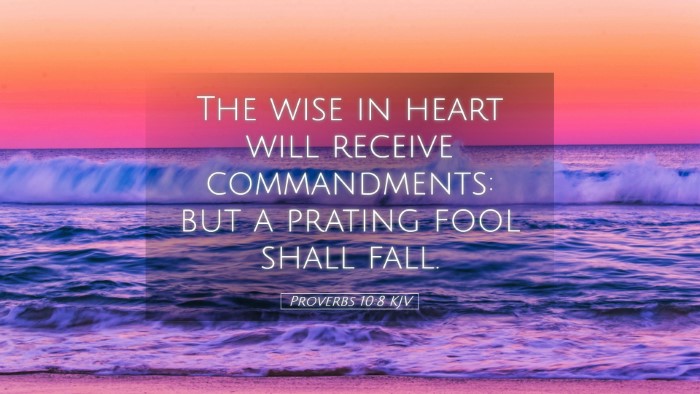Commentary on Proverbs 10:8
Verse: "The wise in heart will receive commandments: but a prating fool shall fall."
Introduction
The book of Proverbs contains wisdom that is timeless, and Proverbs 10:8 highlights the profound difference between the wise and the foolish. This particular verse serves as a reflection on the nature of wisdom and folly, as well as the consequences of both. Here we examine insights from esteemed commentators such as Matthew Henry, Albert Barnes, and Adam Clarke.
Key Themes
- The Wise Heart: A characteristic of wisdom is receptiveness to instruction and a willingness to adhere to commandments.
- The Foolish Speech: The verse contrasts the wise with the fool, whose excessive talking often leads to their downfall.
- Consequences of Choices: The outcomes of being wise versus foolish are central to the teaching of Proverbs.
Exegesis of the Verse
The Wise in Heart
Both Matthew Henry and Albert Barnes emphasize that true wisdom comes from the heart, reflecting an inner alignment with God’s commandments. Those who are wise are distinguished by their ability to receive and apply divine instruction in their lives. This reception of commandments speaks to a humble and teachable spirit, open to growth and correction. Wisdom is not merely intellectual knowledge but a heartfelt pursuit of righteousness.
The Commandments
Adam Clarke notes that 'commandments' here can refer to the laws or principles that guide one’s life according to divine will. The wise embrace these teachings, acknowledging that adherence to them leads to a fruitful and fulfilling life. Emphasizing the importance of obeying God’s commandments, Clarke reiterates that wisdom is demonstrated through action—those who understand their value will practice them.
The Prating Fool
In stark contrast, the phrase 'prating fool' captures the essence of folly as it manifests in imprudent speech. Henry describes the fool as someone who talks excessively and mindlessly—characteristics that lead them into danger. The use of 'prating' indicates a level of emptiness in their words, reflecting a lack of depth and understanding.
Characterization of the Fool
Barnes adds that the fool’s folly is not merely in lacking wisdom; it is compounded by their inability to heed wise counsel. The fool’s excessive discussions can be destructive, resulting in foolish behavior and ultimately leading to their fall. This serves as a cautionary reminder of the importance of knowing when to listen, rather than simply speaking.
Practical Applications
The implications of Proverbs 10:8 extend beyond mere intellectual engagement with scripture. Here are key takeaway lessons for pastors, students, and theologians:
- Embrace Humility: Like the wise, individuals are encouraged to approach God’s word with humility and willingness to learn.
- Guard Your Speech: Consider the potential consequences of excess talk; guarding one’s speech is vital for maintaining wisdom.
- Seek Wisdom: Actively pursue wisdom by engaging with scripture, prayer, and wise counsel, acknowledging that wisdom is a continual journey.
- Teachability Leads to Growth: Showing a willingness to accept correction fosters personal and spiritual development.
Conclusion
Proverbs 10:8 succinctly encapsulates the essence of wisdom versus folly. The wise, characterized by a teachable spirit, embrace the commandments of God, while the fool, through their irresponsible speech, seals their own fate. This verse serves as a timeless reminder to cultivate wisdom in our hearts and to be discerning in our speech. As we reflect on this passage and its implications, may we strive to be among the wise, continually seeking and applying the commandments of our Lord.


